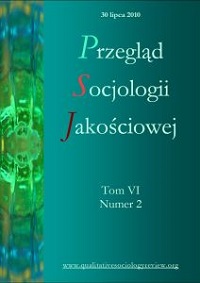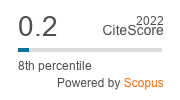Visual Grounded Theory. Teaching Grounded Theory by Images and Visual Analysis
DOI:
https://doi.org/10.18778/1733-8069.6.2.01Keywords:
Visual Grounded Theory, Homelessness, Photography, Visual Sociology, Qualitative Data Analysis, Visual Processes, Teaching Qualitative Methods, Qualitative SociologyAbstract
The paper is based on personal 20-year experience of teaching qualitative methods and methodology of grounded theory. In the following paper I would like to show the usefulness of visual analysis in teaching methodology of grounded theory. A very important tool is sequencing of pictures which gives a comparative insight into empirical data and teaches the comparative method. Students can learn how to compare and find patterns in empirical instances which have visual character. Some of the sequences show stages of action and the sequence which is a linear representation of activity. In other case, the sequences of pictures given to students are not planned. They are almost accidentally created and force students to find patterns by means of the comparative analysis. We should always know what was happening before a picture was taken as well as afterwards, it is similar to sequences analysis in textual data (Silverman, 2007: 61 –84; 146). Students are also encouraged to saturate categories using data from photos. This helps them to proceed with the research from empirical incidents to conceptually elaborated properties of categories and finally to the definition of category. They also get familiar with the procedure of saturating category. In this way they learn visual grounded theory, that is using the visual images for generating categories, properties and hypotheses.
Downloads
References
Anderson, Nels (1923/1965) The Hobo. The Sociology of the Homless Man. Chicago, London: Phoenix Books, The University of Chicago Press.
Google Scholar
Banks, Marcus (2007) Using Visual Qualitative Data. LA, London, New Delhi, Singapore: Sage.
Google Scholar
Blumer, Herbert (1969/2007) Interakcjonizm symboliczny. Kraków: Nomos.
Google Scholar
Bryant, Anthony i Kathy Charmaz (2007) The Sage Handbook of Grounded Theory. Los Angeles, London, New Delhi, Singapore: Sage.
Google Scholar
DOI: https://doi.org/10.4135/9781848607941
Borkowska, Iwona i Radosław Skrobacki (2008) "Fotoopowieści kobiet i mężczyzn – co ich łączy, a co dzieli?" w Do zobaczenia. Socjologia wizualna w praktyce badawczej, pod redakcją J. Kaczmarek. Poznań: Wydawnictwo Naukowe UAM.
Google Scholar
Charmaz Kathy (2009) Teoria Ugruntowana. Praktyczny przewodnik po analizie jakościowej. Warszawa: PWN.
Google Scholar
Chenail, Ronald (2004) When Disney meets the research park: Metaphors and models for engineering an online learning community of tomorrow. Internet and Higher Education, 7(2), 107-121. Dostęp: 14.02.2009 http://www.nova.edu/~ron/Disney.pdf
Google Scholar
DOI: https://doi.org/10.1016/j.iheduc.2004.03.001
Chenail, Ronald (2008) "YouTube as a qualitative research asset: Reviewing user generated videos as learning resources." The Weekly Qualitative Report 1(4), 18-24. Dostęp: 14.02.2009 http://www.nova.edu/ssss/QR/WQR/youtube.pdf
Google Scholar
Chenail, Ronald J., Spong, Jennifer L., Chenail, Jan, Liscio, Michele, McLean, Lenworth. G., Cox, Holly G., Shepherd, Brenda i Mowzoon, Nura C. (2006). "Creating and using learning objects in qualitative research education." The Qualitative Report 11(3): 450-473. Dostęp: 14.09.2009 http://www.nova.edu/ssss/QR/QR11-3/chenail.pdf
Google Scholar
Chenail, Ronald. J., St. George, Sally, Wulff, Dan, Duffy, Maureen, Laughlin, Martha, Warner, Kate i Sahni, Tarmeen (2007). "Mentoring qualitative research authors globally: The Qualitative Report experience." The Qualitative Report, 12(1): 67-81. Dostęp: 14.02.2009 http://www.nova.edu/ssss/QR/QR12-1/chenail.pdf
Google Scholar
Clarke, Adele (2005) Situational Analysis: Grounded Theory after the Postmodern Turn. Thousand Oaks, Ca: Sage.
Google Scholar
Corbin, Juliet i Anselm Strauss (2007) Basics of Qualitative Research. Techniques and Procedures for Developing Grounded Theory. 3rd Edition. London: Sage.
Google Scholar
DOI: https://doi.org/10.4135/9781452230153
Drozdowski, Rafał (2008) "Autodefiniujące pamiątki." w Wyobraźnia społeczna. Horyzonty – źródła – dynamika. Uwarunkowania strategii dostosowawczych współczesnego społeczeństwa polskiego – studium socjologiczne, pod redakcją R. Drozdowski i M. Krajewski. Poznań: Wydawnictwo UAM.
Google Scholar
Drozdowski, Rafał i Marek Krajewski, redaktorzy (2008) Wyobraźnia społeczna. Horyzonty – źródła – dynamika. Uwarunkowania strategii dostosowawczych współczesnego społeczeństwa polskiego – studium socjologiczne. Poznań: Wydawnictwo UAM.
Google Scholar
Glaser, Barney (1965) "The Constant Comparative Method of Qualitative Analysis." Social Problems 12(4): 436 – 445.
Google Scholar
DOI: https://doi.org/10.2307/798843
Glaser, Barney (1978) Theoretical Sensitivity. San Francisco: The Sociology Press.
Google Scholar
Glaser, Barney i Anselm Strauss L. (1967) Discovery of Grounded Theory. Strategies for Qualitative Research. Chicago : Aldine.
Google Scholar
DOI: https://doi.org/10.1097/00006199-196807000-00014
Goode, David (2007) Playing With My Dog Katie. An Ethnomethodological Study of Dog– Human Interaction. West Lafayette, Indiana: Purdue University Press.
Google Scholar
Hesse – Biber, Sharlene N. (2007) "Teaching Grounded Theory.” W The Sage Handbook of Grounded Theory, pod redakcją A. Bryant i K. Charmaz. Los Angeles, London, New Delhi, Singapore: Sage.
Google Scholar
Hurworth, Rosalind E. (2008) Teaching qualitative research: Cases and issues. Rotterdam: Sense Publishers.
Google Scholar
DOI: https://doi.org/10.1163/9789087902056
Iacocca, Lee i William Novak (1984) Iaccoca – An Autobiography. New York: The Bantam Dell Publishing Group.
Google Scholar
Johnsen, Sarah i John May and Paul Cloke (2008) "Imag(in)ing ‘homeless places’: using auto – photography to re-examine the geographies of homelessness." Area 40(2): 194 – 207.
Google Scholar
DOI: https://doi.org/10.1111/j.1475-4762.2008.00801.x
Jahoda, Marie, Paul Lazarsfeld, Hans Zeisel (2007) Bezrobotni Marienthalu. Warszawa: Oficyna Naukowa.
Google Scholar
Knoblauch, Hubert i Bernt Schnettler, Jurgen Raab, Hans Georg Soeffner (2006) Video Analysis: Methodology and Methods. Qualitative Audiovisual Data Analysis in Sociology. Frankfurt am Main: Peter Lang.
Google Scholar
DOI: https://doi.org/10.3726/978-3-653-02667-2
Kaczmarek, Jerzy, redaktor (2008) Do zobaczenia. Socjologia wizualna w praktyce badawczej. Poznań: Wydawnictwo Naukowe UAM.
Google Scholar
Konecki, Krzysztof Tomasz (2000) Studia z metodologii badań jakościowych. Teoria ugruntowana. Warszawa: PWN.
Google Scholar
Konecki, Krzysztof Tomasz (2008) "Dotyk i wymiana gestów jako element wytwarzania więzi emocjonalnej. Zastosowania socjologii wizualnej i metodologii teorii ugruntowanej w badaniu interakcji zwierząt i ludzi." Przegląd Socjologii Jakościowej IV(1). Dostęp grudzień 2008 http://www.qualitativesociologyreview.org/PL/Volume6/PSJ_4_1_Konecki.pdf
Google Scholar
DOI: https://doi.org/10.18778/1733-8069.4.1.04
Liberman, Kenneth (2004) Dialectical Practice In Tibetan Philosophical Culture. An Ethnomethodological Inquiry Into Formal Reasoning. Lanham, Boulder, New York, Toronto, Plymouth, UK: Rowman & Littlelfield Publishers.
Google Scholar
Mastenbroek, Willem (2000) "Organizational Behaviour As Emotion Management". S. 19-35 w Emotions in the workplace, pod redakcją Neal M. Ashkanasy, Charmine E.J Härtel i Wilfred J. Zerbe. Quorum Books, Westpoort, Connecticut/London.
Google Scholar
Pink, Sarah (2007) Doing Visual Ethnography. London, Thousand Oaks, New Delhi: Sage.
Google Scholar
DOI: https://doi.org/10.4135/9780857025029
Radley, Alan, Darin Hodgetts i Andrea Cullen (2005) "Vizualizing homlessness: a study in photography and estrangement." Journal of Community and Applied Social Psychology, 15: 273 – 295.
Google Scholar
DOI: https://doi.org/10.1002/casp.825
Schubert, Cornelius (2006) "Video Analysis of Practice and Practice of Video Analysis. Selecting field and focus in videography." W Video Analysis: Methodology and Methods. Qualitative Audiovisual Data Analysis in Sociology, pod redakcją H. Knoblauch, B. Schnettler, J. Raab, H. G. Soeffner. Frankfurt am Main: Peter Lang.
Google Scholar
Silverman, David (2007) A Very Short, Fairly Interesting And Reasonably Cheap Book About Qualitative Research, LA, London, New Delhi, Singapore: Sage.
Google Scholar
Strübing, Jörg (2004) Grounded Theory. Zur sozialtheoretischen und epistemologischen Fundierung des Verfahrens der empirisch begründeten Theoriebildung (Reihe: Qualitative Sozialforschung Bd. 15). Wiesbaden: VS Verlag für Sozialwissenschaften.
Google Scholar
Strübing, Jörg (2007) Anselm Strauss. Konstanz: Uvk Verlags GmbH.
Google Scholar
Suchar, Charles (1997) "Grounding visual research in shooting scripts." W Qualitative Sociology 20(1): 33-55.
Google Scholar
DOI: https://doi.org/10.1023/A:1024712230783
Downloads
Published
How to Cite
Issue
Section
License

This work is licensed under a Creative Commons Attribution-NonCommercial-NoDerivatives 4.0 International License.














